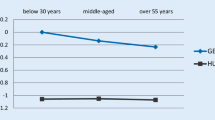Abstract
The aim of this study is to analyse and compare the levels of job satisfaction reported by self-employed and salaried workers (aged 50–64) by disability status across Europe. Particular attention is paid to testing whether the effect of self-employment on job satisfaction is greater for disabled workers as compared to non-disabled ones. Using the first two waves (2004 and 2007) of the Survey of Health, Ageing and Retirement in Europe (SHARE) for eleven countries, we estimate job satisfaction equations for older workers with and without disabilities. The results show that self-employed persons are more satisfied with their jobs. However, there is no evidence that the association between self-employment and job satisfaction is different for disabled and non-disabled older persons. Policy makers can promote self-employment among older workers with disabilities to increase their employment and income rates and levels of job satisfaction.
Similar content being viewed by others
References
Baldwin M, Johnson W (1994) Labor market discrimination against men with disabilities. J Hum Resour 29(31):865–887
Baldwin M, Johnson W (1995) Labor market discrimination against women with disabilities. Ind Relat 34(4):555–577
Baltagi B, Song S (2006) Unbalanced panel data: a survey. Stat Pap 47:493–523
Benz M, Frey B (2008a) The value of doing what you like: evidence from the self-employed in 23 countries. J Econ Behav Organ 68:445–455
Benz M, Frey B (2008b) Being independent is a great thing: subjective evaluations of self-employment and hierarchy. Economica 75:362–383
Blanchflower D (2004) Self-employment: more may not be better. NBER Working paper no. 10286
Blanchflower D, Oswald A (1998) What makes an entrepreneur? J Lab Econ 16(1):26–60
Börsch-Supan A, Jürges H (2005) The survey of health, ageing and retirement in europe–methodology. Mannheim Research Institute for the Economics of Aging, University of Mannheim, Mannheim
Boylan A, Burchardt T (2002) Barriers to self-employment for disabled people. Report for the Small Business Services
Burchardt T (2000) The dynamics of being disabled. J Soc Policy 29(4):645–668
Buttner H (1992) Entrepreneurial stress: is it hazardous to your health. J Manag Issues 4(2):223–240
Chirikos T, Nestel G (1984) Economic determinants and consequences of self-reported work disability. J Health Econ 3(2):117–136
Clark A (1997) Job satisfaction and gender: why are women so happy at work? Lab Econ 4(4):341–372
Clark A, Oswald A (1996) Satisfaction and comparison income. J Public Econ 61(3):359–381
Clark A, Colombier N, Masclet D (2008) Never the same after the first time: the satisfaction of the second-generation self-employed. Int J Manpow 29(7):591–609
Cowling M, Taylor M (2001) Entrepreneurial women and men: two different species? Small Bus Econ 16:167–175
Diaz-Serrano L, Cabral J (2005) Low pay, higher pay and job satisfaction within the European union: empirical evidence from fourteen countries. IZA Discussion paper no. 1558
Doyel A (2002) A realistic perspective of risk in self-employment for people with disabilities. J Vocat Rehabil 17:115–124
European Commission (2009) Employment in Europe 2009. Employment and Social Affairs
Ferraro K, Farmer M, Wybraniec J (1997) Health trajectories: long-term dynamics among black and white adults. J Health Soc Behav 38:38–54
Ferrer-i-Carbonell A, Frijters P (2004) How important is methodology for the estimates of the determinants of happiness? Econ J 114:641–659
Gannon B (2005) A dynamic analysis of disability and labour force participation in Ireland, 1995–2000. Health Econ 14:925–928
Gannon B, Munley M (2009) Age and disability: explaining the wage differential. Soc Sci Med 69:47–55
Griffin C, Hammis D (2002) Jimbo’s Jumbos: a primer on small business planning. J Vocat Rehabil 17:87–96
Johnson W, Lambrinos J (1985) Wage discrimination against handicapped men and women. J Hum Resour 20(2):264–277
Jones M, Latreille P, Sloane P (2006) Disability, gender and the British labour market. Oxf Econ Pap 58:407–449
Kaufmann P (1999) Franchising and choice of self-employment. J Bus Ventur 3(2):89–95
Kreider B (1999) Latent work disability and reporting bias. J Hum Resour 34(4):734–769
Lange T (2009) Job satisfaction and self-employment: autonomy or personality. Small Bus Econ. doi:10.1007/s11187-009-9249-8
McFarlane F (1998) Personnel development in the field of disability with a focus on employment outcomes. Disabil Soc 13(4):575–585
Naughton T (1987) Quality of working life and the self-employed manager. Am J Small Bus 12(2):33–41
Ng Y (1997) A case of happiness, cardinalism, and interpersonal comparability. Econ J 107(445):1848–1858
Nolan B, Watson D, Williams J, Noonan P, O’Connor A, Browne J (2003) Designing and piloting an Irish disability research instrument based on WHO ICF. National Disability Authority, Dublin
OECD (2000) Employment Outlook, Paris
OECD (2003) Transforming disability into ability: policies to promote work and income security for disabled people. Directorate for Employment, Labour and Social Affairs, Paris
Pagan R (2009) Self-employment among people with disabilities: evidence for Europe. Disabil Soc 24(2):217–229
Piggott L, Sapey B, Wilenius F (2005) Out of touch: local government and disabled people’s employment needs. Disabil Soc 20(6):599–611
Schwartz N (1995) What respondents learn from questionnaires: the survey interview and the logic of conversation. Int Stat Rev 63:153–177
Sloane P, William H (2000) Job satisfaction, comparison earnings and gender. Labour 14(3):473–501
Van Praag B (1991) Ordinal and cardinal utility: an integration of the two dimensions of the welfare concept. J Econ 50:69–89
Verbeek M, Nijman T (1992) Testing for selectivity bias in panel data models. Int Econ Rev 33(3):681–703
Verbrugge L, Reoma J, Gruber-Baldini A (1994) Short-term dynamics of disability and well-being. J Health Soc Behav 35(2):97–117
Acknowledgments
The author thanks an anonymous reviewer and the editor for useful comments and suggestions. This article uses data from the SHARE, which has been primarily funded by the European Commission through the 5th framework programme (project QLK6-CT-2001- 00360 in the thematic programme Quality of Life), through the 6th framework programme (projects SHARE-I3, RII-CT- 2006-062193, COMPARE, CIT5-CT-2005-028857, and SHARELIFE, CIT4-CT-2006-028812) and through the 7th framework programme (SHARE-PREP, 211909 and SHARE-LEAP, 227822). The usual disclaimer applies.
Author information
Authors and Affiliations
Corresponding author
Additional information
Responsibe editor: D.J.H. Deeg
Appendix
Appendix
See Table 5
Rights and permissions
About this article
Cite this article
Pagán-Rodríguez, R. Self-employment and job satisfaction: evidence for older people with disabilities in Europe. Eur J Ageing 8, 177–187 (2011). https://doi.org/10.1007/s10433-011-0194-4
Published:
Issue Date:
DOI: https://doi.org/10.1007/s10433-011-0194-4



